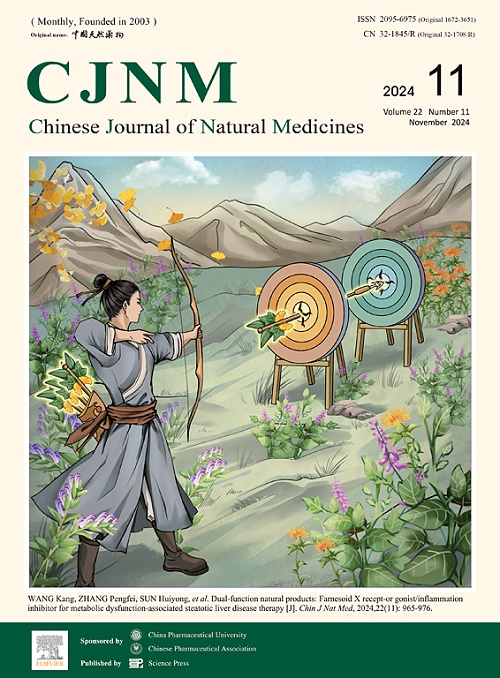Talaketides A−G, linear polyketides with prostate cancer cytotoxic activity from the mangrove sediment-derived fungus Talaromyces sp. SCSIO 41027
IF 4
2区 医学
Q1 INTEGRATIVE & COMPLEMENTARY MEDICINE
引用次数: 0
Abstract
Seven novel linear polyketides, talaketides A−G (1−7), were isolated from the rice media cultures of the mangrove sediment-derived fungus Talaromyces sp. SCSIO 41027. Among these, talaketides A−E (1−5) represented unprecedented unsaturated linear polyketides with an epoxy ring structure. The structures, including absolute configurations of these compounds, were elucidated through detailed analyses of nuclear magnetic resonance (NMR) and high-resolution mass spectrometry (HR-MS) data, as well as electronic custom distributors (ECD) calculations. In the cytotoxicity screening against prostate cancer cell lines, talaketide E (5) demonstrated a dose-dependent inhibitory effect on prostate cancer PC-3 cell lines, with an IC50 value of 14.44 μmol·L−1 . Moreover, compound 5 significantly inhibited the cloning formation of PC-3 cell lines and arrested the cell cycle in S-phase, ultimately inducing apoptosis. These findings indicate that compound 5 may serve as a promising lead compound for the development of a potential treatment for prostate cancer.
来自红树林沉积物的真菌 Talaromyces sp. SCSIO 41027 的具有前列腺癌细胞毒性活性的线性多酮化合物 Talaketides A-G
从红树林沉积物衍生真菌 Talaromyces sp. SCSIO 41027 的水稻培养基中分离出了七种新型线性多酮苷,即 Talaketides A-G(1-7)。其中,Talaketides A-E(1-5)代表了前所未有的具有环氧环结构的不饱和线性多酮。通过对核磁共振(NMR)和高分辨率质谱(HR-MS)数据的详细分析以及电子定制分配器(ECD)计算,阐明了这些化合物的结构,包括绝对构型。在针对前列腺癌细胞株的细胞毒性筛选中,talaketide E(5)对前列腺癌 PC-3 细胞株具有剂量依赖性抑制作用,IC50 值为 14.44 μmol-L-1。此外,化合物 5 还能明显抑制 PC-3 细胞株的克隆形成,并使细胞周期停滞在 S 期,最终诱导细胞凋亡。这些研究结果表明,化合物 5 可作为一种有前途的先导化合物,用于开发潜在的前列腺癌治疗方法。
本文章由计算机程序翻译,如有差异,请以英文原文为准。
求助全文
约1分钟内获得全文
求助全文
来源期刊

Chinese Journal of Natural Medicines
INTEGRATIVE & COMPLEMENTARY MEDICINE-PHARMACOLOGY & PHARMACY
CiteScore
7.50
自引率
4.30%
发文量
2235
期刊介绍:
The Chinese Journal of Natural Medicines (CJNM), founded and sponsored in May 2003 by China Pharmaceutical University and the Chinese Pharmaceutical Association, is devoted to communication among pharmaceutical and medical scientists interested in the advancement of Traditional Chinese Medicines (TCM). CJNM publishes articles relating to a broad spectrum of bioactive natural products, leading compounds and medicines derived from Traditional Chinese Medicines (TCM).
Topics covered by the journal are: Resources of Traditional Chinese Medicines; Interaction and complexity of prescription; Natural Products Chemistry (including structure modification, semi-and total synthesis, bio-transformation); Pharmacology of natural products and prescription (including pharmacokinetics and toxicology); Pharmaceutics and Analytical Methods of natural products.
 求助内容:
求助内容: 应助结果提醒方式:
应助结果提醒方式:


